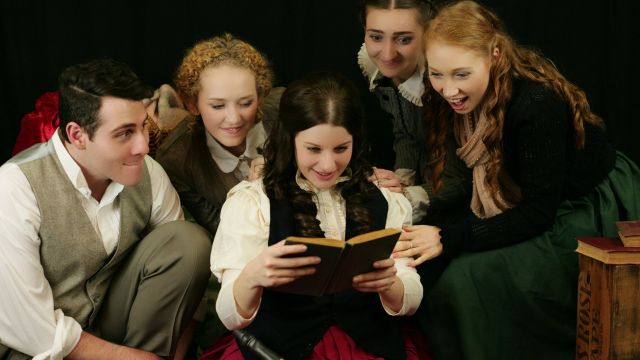Little Women
Louisa May Alcott’s novel Little Women, about the four March sisters and their Marmee set during America’s Civil War, has been beloved by generations of women and men (mostly women) in print, film and theatre. This is not the first time the sprawling novel had been adapted into a musical but it’s one of the best, and Prima’s production of it is one of the best and most satisfying community theatre productions of the year.
Director Melanie Evans has assembled a strong cast of musical theatre performers to bring this charming and sweet chamber musical to life.
The character of Jo dominates Alcott’s novel and this adaptation and Lara Boyle gives the perfect performance of it. Wilful and feisty, yet vulnerable, she captures the spirit and pathos of the role and sings the heart out of “Astonishing”, a song in the vein of Wicked’s “Defying Gravity”. Sarah Chappell’s Amy was also a standout, bringing out the petty and jealous strains of the adolescent sibling and later revealing an accomplished adult with flaws.
No actress can go wrong with the part of Marmee, the long-suffering mother who holds the household together while father is off fighting the war. Melissa Beilby succeeded grandly. She gave the role warmth, was critical of her offspring but always supportive and loving and got to sing two of the score’s best ballads, “Here Alone” and “Days of Plenty”.

The other performance to be noticed in this tight ensemble cast was Liam J. O’Byrne’s Laurie. Whether playing the rejected suitor, the loving husband, or the melodramatic ‘Rodrigo,’ he was assured and confident and brought a nice touch of humour to his and Amy’s duet “The Most Amazing Thing”.
Antony Beadle found a slight but appealing guttural accent for Professor Bhaer, Meg Kiddle’s waspish demeanour was so right for Aunt March, Phil Halpin was a kindly Mr Laurence, whilst Rachael MacNaught and Eliza King as Beth and Meg imbued their characters with some nice individual traits.
The costumes were outstanding, especially the grand hoop-skirts for the ladies, while the composite but cramped set swiftly established the New England 1860’s period with a changing window projection of the landscape.
Jason Howland and Mindi Dickstein’s score is not top-drawer Broadway, but it does have some nice things in it with a nod to the parlour songs of the period. Beth and Mr Laurence’s “Off to Massachusetts” being a good example. Musical Director Andrew Wadley and vocal coach Dale Cox are to be congratulated on achieving such a high standard of vocals. They gave the production class.
Peter Pinne
Subscribe to our E-Newsletter, buy our latest print edition or find a Performing Arts book at Book Nook.

